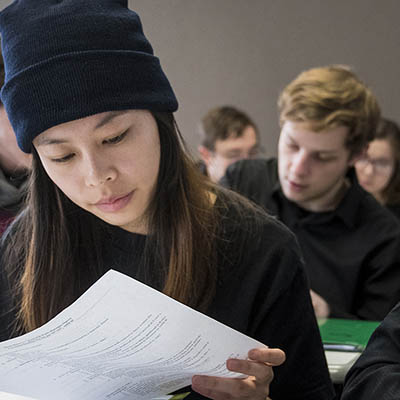

Foundation for a Changing World
The General Education component of higher education specifically focuses on introducing students to ways of knowing, integrative knowledge, appreciation of historical context, common themes of human experience, social responsibility, analytical reasoning, civic engagement, or the development of practical skills and reflective habits of mind. The General Education requirements at Washburn University are designed with the intent of providing students with a grounding in liberal arts and sciences and shaping an informed, capable citizenry through a broad education in a range of disciplines. These courses ensure that you are equipped with the knowledge and skills necessary to engage with our rapidly-changing world over your lifetime.
Learning Outcomes
In order to accomplish these goals, students will complete core courses in composition and mathematics and a broad range of course work in Arts and Humanities, Social Sciences, and Natural Sciences and Mathematics designed specifically to meet the following five major learning outcomes:
General Education Distribution Courses
While all courses offered at the university educate students in most if not all of the five learning outcomes identified as critical to providing an educated citizenry, some courses are designed to emphasize and assess particular learning outcomes. All of the courses in the core and general education distribution requirements have been identified as meeting a specified student learning outcome. However, general education distribution courses must be completed outside your major. The number of general education distribution hours will depend on the specific degree requirements of your chosen academic field.
Transfer students who have completed a baccalaureate degree at an institution of higher education accredited by one of the six regional accrediting organizations are considered to have satisfied general education requirements, and are therefore not required to meet Washburn's specific general education requirements. This includes all aspects of the general education program including the core coursework and the general education distribution hours. Students will, however, be required to meet degree requirements that are specific to certain Bachelor and Associate degrees including required courses in correlate areas associated with an academic major.
For transfer students who have not completed a baccalaureate degree, courses completed at a college or university accredited by one of the six regional accrediting organizations which have been designated by the sending institution as general education courses will transfer to Washburn University as courses within the appropriate general education distribution area without further review. In addition, courses listed by the Kansas Board of Regents as a Kansas System-Wide Transfer (KSWT) course at https://www.kansasregents.org/transfer_articulation will transfer as their listed Washburn University equivalent course without further review. Note: the policy is not intended to circumvent specific general education requirements for particular majors. This is a most important distinction and should be noted by students and their advisor.
Exceptions to this transfer policy include the following: 1) The core requirements in English, Mathematics, and College Experience not addressed by KSWT must be approved as equivalent courses by the relevant departments unless the student has completed a baccalaureate degree from a regionally accredited institution. 2) Courses not included in the sending institution's general education program which a transfer student believes may meet the spirit and intent of Washburn University's general education program must be reviewed by the General Education Committee. 3) General education coursework from technical colleges and institutes accredited by one of the six regional accrediting organizations must be reviewed by the General Education Committee. 4) Courses that may satisfy a major requirement or a prerequisite to a major requirement must be reviewed by the major department chairperson. Please work with your advisor to complete the General Education Transfer Course form to submit for review and potential acceptance toward your general education distribution groupings if any of your transfer courses fall under these exceptions.

